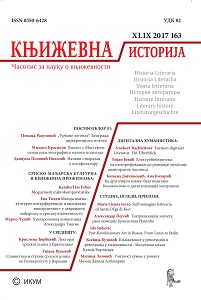Уметност сумње у роману Мамац Давида Албахарија
The Art of Doubt in the Novel Bait by David Albahari
Author(s): Milica LazovićSubject(s): Other Language Literature
Published by: Институт за књижевност и уметност
Keywords: doubt;creativity;life;language;silence;review;borders;
Summary/Abstract: The paper analyzes the theme of creativity in the novel Bait by David Albahari,as it is closely connected with the question of language and silence in the literary work. Doubt connects creativity with language, and is closely related to the possibility of writing, as well as the ability of words to express the complexity of human experience. The lack of trust in the words of the narrator, who wants to become a writer, alternates with his unconditional faith in the omnipotence of language and its unique qualities. He questions his own creative abilities, while his doubt in the epistemological, but also ontological status of the world, leads him to the belief that silence is the basis of reality, while utterance is its natural quality. For a writer, silence,as an integral part of being, is not a void, but the key that contains the unrealized possibilities, where he draws his material from and creates the imaginary world of a literary work. The identity of the narrator in Albahari’s novel is determined by his boundary position, since he is at the crossroads of the two countries and two languages, struggling with the past and making sense of the present, trapped in the gap between literature and existence and unable to define himself by their complex relations. Faced with a new environment and a different language, the narrator reaches for his mother’s confession recorded on tape shortly before her death and his trip to Canada, hoping that her testimony will clarify the important factors of his identity. The conversations with his poetic alter ego, the Canadian writer Donald,which reflect the writer’s most important autopoetic attitudes, have the same function. The circumstances of life are bringing the narrator back to various forms and roles of language, pointing out that at all times and in all places the writer’s (native) language remains his only true reality.
Journal: Књижевна историја
- Issue Year: 49/2017
- Issue No: 163
- Page Range: 327-339
- Page Count: 13
- Language: Serbian

